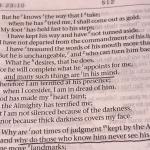The Preacher (Koheleth or Qoheleth) weighs in on the gift of work. The Bible has much to say on the topic. Ecclesiastes offers some interesting insights as well.
i. opinion | a little more about the author
In my opinion, Koheleth is most likely King Solomon sharing wisdom near the end of his days. He’s seen it all, been there, done that, got the t-shirt.
I picture Koheleth as perhaps a late middle aged man, maybe a little older, working quietly in a corner of the coffee shop. His wise gaze sees the younger generations as they madly rush along through their days.

What could he offer to them, and would they even listen?
He has learned to become critical in some ways, to tell it like it is in other ways. However, there is purpose to the way he chides us and prods us. He is definitely not an Existentialist, attempting to help us find the ultimate meaning for our lives. He’s not a pessimist either because he does eventually draw our eyes to God. I would say Koheleth is a realist to say the least. He reminds me of an aging Generation X-er who knows God well, if we’ll only take time to listen.
To read more in this series (and other articles in my category The Writings) CLICK HERE
The Bible selection for this piece is Ecclesiastes 4.1-6 CLICK HERE
ii. dog-eat-dog, a distortion of the gift of work
There is a saying in the corporate world, “dog-eat-dog,” which capsulizes the cutthroat mentality of doing whatever it takes to climb the corporate ladder. At all costs, we have to keep up with the Joneses.
Koheleth recognizes that this is a prevalent problem in his day. He addresses, envy, jealousy, and laziness at work.
Koheleth “considered,” or sees and perceives “all travail,” toilsome, burdensome labor (Ecclesiastes 4.4, KJV). He sees every “right,” successful or skillful, “work.” There are a couple different ways translators look at this verse. One is that good work produces envy in others (i.e. KJV, NKJV). The other view is that every good work is produced as a result of the envy and rivalry between neighbors, i.e. competition (NIV, NAS, RSV).
Whatever the case, man is envied, not as much by his enemy as by his “neighbor,” his friend, companion, fellow-citizen. The preacher views this strain between close companions as “vanity, and vexation of spirit” (verse 4).
Envy troubles us to our very core. This term “spirit” is the Hebrew word ruwach, also translated breath. This inner man can be vexed, prone to longing or striving, to attain what one envies.
“Futility and emptiness result from the constant human search for the meaning of life. He is particularly aware of the useless attempts to understand the mystery of divine purpose behind the order of the world as it is, the tragic finality of death, the reasons for success and failure, and the justice of rewards and punishment for good and evil behavior. These are beyond our capabilities to discover.” (Lawrence Boadt, Reading in the Old Testament: An Introduction, Paulist Press, p. 484)
iii. the foolishness of avoiding work
Koheleth recognizes that just as there people who are motivated by an envious dog-eat-dog mentality, there are others who simply give up trying. He calls this type of person “the fool,” literally stupid, dull, simple, etc. (Eccl 4.5, KJV).
Fool, or kesil in Hebrew, is a unique term only used in Proverbs and Ecclesiastes. Foolishness does not refer to lack of intelligence, but to a person’s tendency to make bad decisions.
One bad decision of the fool is that he, “foldeth his hands together, and eateth his own flesh” (Eccl 4.5). This is probably some sort of Hebrew idiom for bringing oneself to destruction. It may be better translated, “Fools fold their hands and ruin themselves” (NIV).
“The sluggard is guilty of moral suicide; he takes no trouble to provide for his necessities, and suffers extremities in consequence.” (W.J. Deane, “Ecclesiastes,” The Pulpit Commentary: Proverbs, Ecclesiastes, Song of Solomon, vol. 9, ed. H.D.M. Spence and Joseph S. Exell, Wm. B. Eerdmans, p. 89)
The fool’s actions are the backdrop for the the next statement:
“better is a hand full of rest . . . than two hands full of travail . . . the fool’s defense of his indolence.” (on Eccl 4.6, W.J. Deane, “Ecclesiastes,” The Pulpit Commentary: Proverbs, Ecclesiastes, Song of Solomon, vol. 9, ed. H.D.M. Spence and Joseph S. Exell, Wm. B. Eerdmans, p. 89)
Here we have a glimpse into the fool’s mindset, with possibly a foolish saying of the time. It would be better to have a hand full of rest and quiet than two hands full of work that produces travail, toil, vexation.
The fool considers the toil of work and asks, “Why work at all?”













